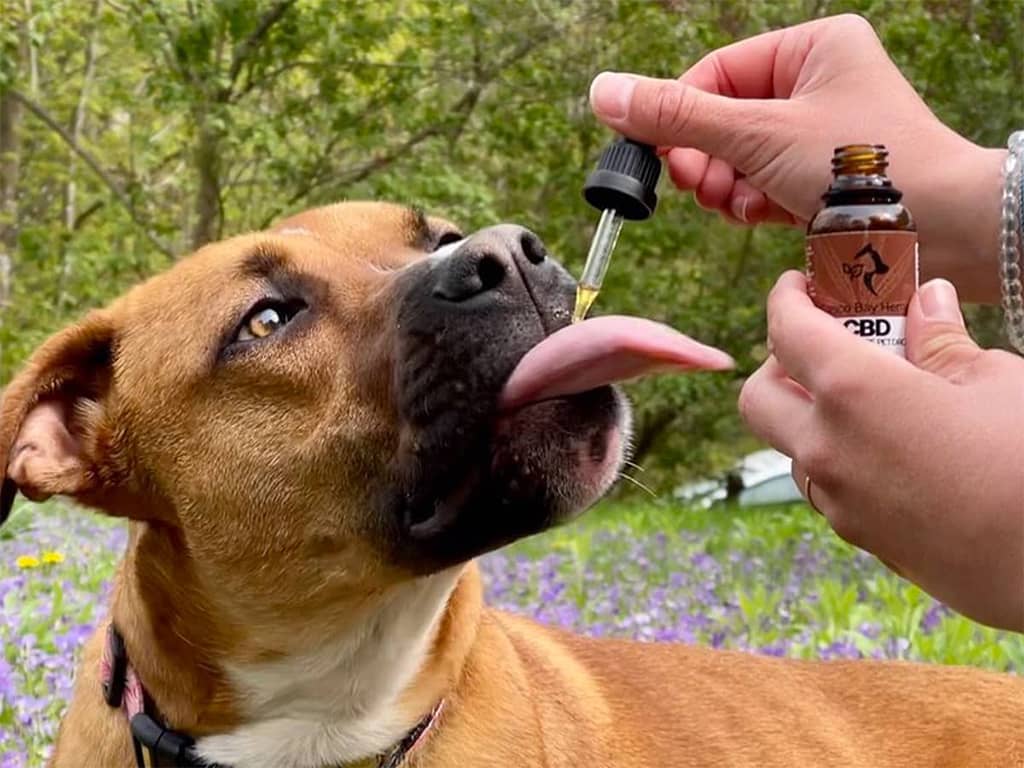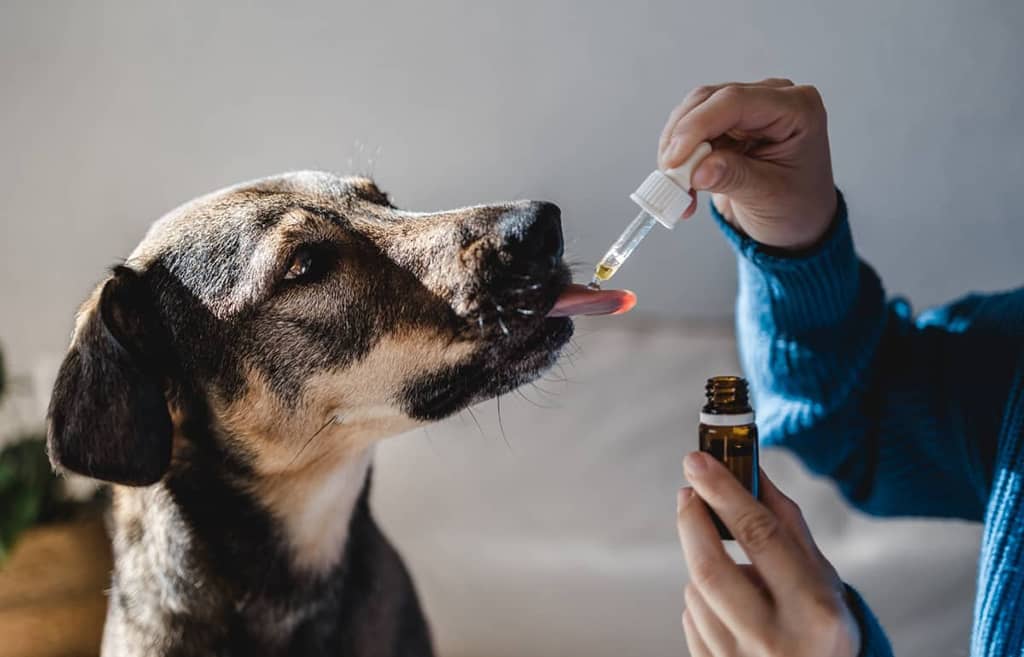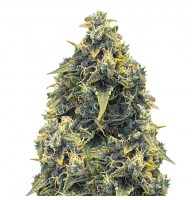Table of contents
- What is CBD oil?
- Beneficial properties of CBD oil for dogs
- Relief for pain in animals
- CBD in cancer treatment
- Reducing symptoms of anxiety, stress and epilepsy
- How does CBD oil work?
- Processes and functions of the ECS
- Choosing a CBD oil for your dog
- Choosing the spectrum
- How much CBD oil does a dog need to take?
- Drug concentration and dosage
- CBD oil for dogs: is it really safe?
- Veterinary advice and consultation
- Conclusion
CBD oil for dogs has tremendous therapeutic potential. Its properties can help your pet relieve pain, calm anxiety, and manage seizures. CBD for dogs is an important trend in natural pet medicine, and it is generating interest and debate among dog owners and veterinarians. In this detailed guide, we'll take a look at all the ins and outs of CBD oil, its potential health benefits, and recommendations for using it for canine purposes. These helpful tips will help improve your dog's health and well-being.
Our goal is to arm you with the knowledge you need to make the right decisions about incorporating CBD oil into your beloved animal's wellness diet.
Key takeaways:
- CBD oil: non-psychoactive substance, used for pain, anxiety, seizures and potential cancer support in dogs.
- Effective interaction: CBD works through the endocannabinoid system in dogs.
- Product selection: Choose a high quality CBD oil, preferably lab tested, and most importantly suitable for your dog's needs (full spectrum, broad spectrum, or isolate).
- Dosage: start with a low dosage, adjust the amount as needed, and be sure to consult your veterinarian.
- Safety: In general, CBD oil is safe, with minor side effects possible in rare cases. A veterinarian's advice is never superfluous.
- Labeling: always check for clear labels on the packaging with detailed information about the product.
What is CBD oil?
Cannabidiol or CBD is a naturally occurring compound found in cannabis plants grown from the seeds of medical cannabis. It is one of over 100 cannabinoids found in these plants, but it is particularly notable for its therapeutic properties. Unlike its counterpart THC (tetrahydrocannabinol), CBD is not a psychoactive substance, meaning it does not produce the “high” associated with marijuana. This distinction is extremely important for pet owners considering CBD products for their dogs, as THC is not well tolerated by all animals and can even harm a dog.
The beneficial properties of CBD oil for dogs

The use of CBD oil in veterinary medicine is gaining more and more interest, and several studies point to its potential benefits for various conditions in dogs. Below we will take a look at some of the benefits that are supported by research published in medical journals.
Relief from pain in animals
Arthritis. A study published in the Journal of Pain found that CBD oil significantly reduced pain and improved mobility in dogs with osteoarthritis. This study also showed that the pain reduction occurs without noticeable side effects, which in turn makes CBD a promising alternative for pain relief in dogs.
Chronic pain. Other studies have shown that CBD can help treat chronic pain in dogs. CBD is a safe alternative replacement for traditional painkillers that can have serious side effects.
CBD in cancer treatment
Elimination of symptoms. The research data is still in the early stages, but some of it suggests that CBD can help relieve symptoms associated with cancer and its treatment, such as nausea, pain and loss of appetite. The Journal of Veterinary Internal Medicine has published a review article discussing the potential role of cannabinoids in veterinary oncology and talking about their therapeutic potential.
An anatomical illustration of the dog's internal systems is included, focusing on the areas affected by CBD and providing a visual representation of these interactions.

Reduced symptoms of anxiety, stress and epilepsy
Separation anxiety and noise phobia. A study published in the Journal of the American Veterinary Medical Association demonstrates the effectiveness of CBD oil for dogs with anxiety-like behaviors, such as those caused by separation or loud noises. Dogs taking CBD showed significantly less anxiety and appeared calmer.
Epilepsy. One of the most significant studies in this area, published in the Journal of the American Veterinary Medical Association, found that CBD oil can reduce the frequency of epilepsy seizures in dogs. In 89% of the dogs that took CBD in clinical trials, the frequency of seizures was markedly reduced.
How does CBD oil work?
The effectiveness of CBD oil is attributed to its interaction with the endocannabinoid system (ECS), a complex system of cellular signaling. The endocannabinoid system was discovered in the early 1990s by researchers studying THC, a well-known cannabinoid. The ECS is not yet fully understood, but we do know that the ECS plays a role in the regulation of a number of functions and processes, such as
Processes and functions of the ECS
- Pain sensitivity. CBD can help manage pain by acting on the dog's endocannabinoid receptors, reducing inflammation and interacting with neurotransmitters.
- Anxiety and stress. CBD is involved in the regulation of mood and anxiety. The interaction of CBD with the ECS receptors in the brain can help relieve anxiety and stress in dogs.
- Digestive system health. CBD's anti-inflammatory properties help address digestive issues by relieving symptoms such as inflammatory bowel disease.
- Immunity. CBD can affect the immune system by affecting the production of white blood cells through its interaction with ECS. These are good properties for autoimmune diseases and allergies.
- Neurology. CBD has been shown to be effective in reducing the frequency and severity of epileptic seizures, implying a link to its effects on the ECS in the brain.
How CBD interacts with these systems provides insight into its potential therapeutic effects in canine health.
Choosing the right CBD oil for your dog

When choosing the best CBD oil for dogs, it is very important to understand the variety of CBD products available. The decision largely depends on the type of extract used in these products, with full-spectrum oil being one of the most popular options.
Full-spectrum hemp oil is an oil, one of the most common types of CBD products, produced from the hemp plant and containing all the cannabinoids found in the plant, including CBD. Its uniqueness lies in the combination of cannabinoids, terpenes, and other beneficial compounds. According to the theory, the combination of several cannabis compounds acts synergistically to enhance their therapeutic properties.
Choosing a spectrum
When choosing a CBD oil for your dog, it's important to weigh the benefits of full-spectrum, broad-spectrum, and isolates. Full-spectrum oils have a potentially strong therapeutic effect due to the combined presence of various cannabinoids.
Broad-spectrum oils are a THC-free alternative with similar benefits. For dogs with special sensitivities, a CBD isolate containing only pure CBD may be the most suitable option.
How much CBD oil should a dog take?

Determining the dosage of CBD oil for your dog is the most important aspect of ensuring its effectiveness and safety. The appropriate dosage can vary considerably depending on factors such as your dog's weight, the condition it is treating, the concentration of the specific product, and individual sensitivity to CBD.
Product concentration and dosage
Concentration levels: CBD oils come in a variety of concentrations, usually measured in milligrams (mg) of CBD per milliliter (ml) of oil. It is very important to know what the concentration is in order to prescribe the right dose. Usually the starting dose is 1-2 mg of CBD per 4.5 kg of body weight twice a day. If the initial dose does not produce the desired result after a week, you can gradually increase the dose. Monitor your dog's reaction periodically. Do not exceed the maximum recommended dose indicated in the instructions or specified by your veterinarian.
The oil should be dripped directly into the dog's mouth, preferably under the tongue, to ensure the most effective absorption. If direct application is not possible, you can mix the oil with food. In this case, absorption will be slower.
CBD oil for dogs: is it really safe?

One of the most common questions pet owners ask is whether CBD oil is safe for their dogs. Every year the popularity of CBD products for people is only growing. This interest naturally extends to the potential benefits for pets.
Studies have shown that CBD oil, when used properly, is generally safe for dogs. It is well tolerated and can be a useful supplement to your pet's diet for a variety of health conditions.
Veterinary advice and consultation
Before starting any new supplement, you should consult your veterinarian. This is especially important if your dog has health problems and is currently taking other medications. Your veterinarian will be able to help you choose the right dosage and recommend quality CBD products that are best suited for your pet's specific needs.
When choosing CBD, it is very important to choose the right product that contains THC or without it, as THC is not well tolerated by some animals.
Carefully observe your pet's reaction to CBD oil. Pay attention to positive changes in your dog's condition, as well as possible side effects. Depending on your dog's reaction, you may need to adjust the dosage.
Conclusion
Testimonials and personal stories from dog owners are said to often emphasize the transformative effects of CBD oil. Many of them tell of significant improvements in their pets' quality of life. As interest in CBD oil for dogs continues to grow, it is important for pet owners to approach its use thoughtfully and knowledgeably.















Write a comment